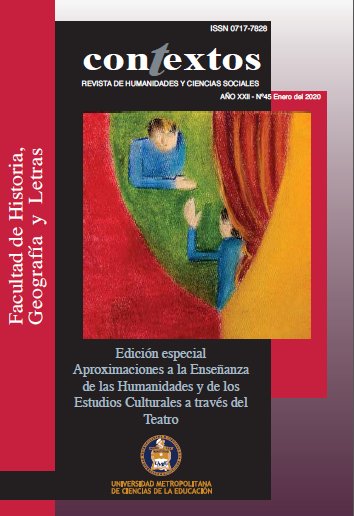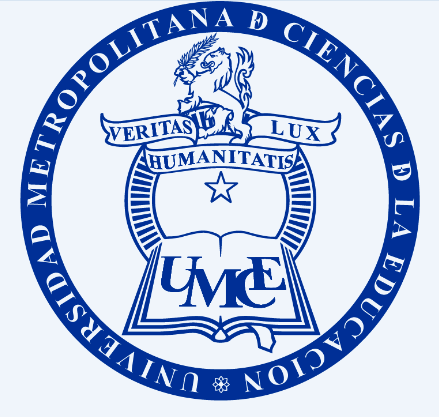Conteúdo do artigo principal
jun 21, 2019
Resumo
Este trabajo ofrece una propuesta pedagógica para incluir el estudio de La monja bruja (2003), de Petrona de la Cruz e Isabel Juárez Espinosa, fundadoras de Fortaleza de la Mujer Maya (FOMMA), dentro del plan de estudios de cursos de teatro latinoamericano para estudiantes de español de un nivel avanzado. Con este propósito, incluyo la bibliografía más reciente sobre la FOMMA; un análisis detallado sobre los procedimientos teatrales que emplean las autoras, y una reflexión sobre la práctica teatral como un tipo de activismo cultural. El artículo concluye con ejercicios de improvisación teatral.
Downloads
Política propuesta para revistas que ofrecen acceso abierto
Aquellos autores/as que tengan publicaciones con esta revista, aceptan los términos siguientes:
- Los autores/as conservarán sus derechos de autor y garantizarán a la revista el derecho de primera publicación de su obra, el cuál estará simultáneamente sujeto a la Licencia de reconocimiento de Creative Commons que permite el uso de este material siempre que se indique su autoría y la fuente original de su publicación (URL de la revista), no se use con fines comerciales y sin derivaciones de la obra original.
- Los autores/as podrán adoptar otros acuerdos de licencia no exclusiva de distribución de la versión de la obra publicada (p. ej.: depositarla en un archivo telemático institucional o publicarla en un volumen monográfico) siempre que se indique la publicación inicial en esta revista.
- Se permite y recomienda a los autores/as difundir su obra a través de Internet (p. ej.: en archivos telemáticos institucionales o en su página web) antes y durante el proceso de envío, lo cual puede producir intercambios interesantes y aumentar las citas de la obra publicada. (Véase El efecto del acceso abierto).
Referências
André, María Claudia. 2015. “Fortaleza de la Mujer Maya: Entrevista a Petrona de la Cruz”. Alba de América35: 371-376.
Blanco-Cano, Rosana. 2009. “Geografías alternativas: Una mujer desesperada(1991) de Petrona de la Cruz y el grupo teatral FOMMA”. Chicana/Latina Studies8: 91-124.
De la Cruz, Petrona e Isabel Juárez Espinosa. (2003). La monja bruja[en línea] Disponible en http://hemisphericinstitute.org/hemi/fr/modules/itemlist/category/69-fomma[Consulta 10/9/2018].
Difarnecio, Doris. 2018. “FOMMA: Teatro popular desde el cuerpo y la memoria”. Revista Conjunto186: 38-43.
Illiano, Antonio; Daniel Testa. 1960. Luigi Pirandello. On Humor. Chapel Hill: The University of North Carolina Press.
Juárez Espinosa, Isabel. 2007. “Reflection on the W ork that is Being Done within FOMMA with Respect to W omen, Gender and Patriarchy, Change, New Generations and New Technologies,”translated from the Spanish by Angela Rose Marino-Segura. In Staging International Feminism, edited by Elaine Aston and Sue-Ellen Case, pp.171-173. New York: Palgrave Macmillan.
Ramirez-Dhoore, Dora. 2012. “Negotiating Conflicting Rhetorics: Rancherasand Documentary in the Classroom”. Feminist Teacher21: 179-194.
Sánchez-Blake, Elvira. 2012. “Teatro maya y resistencia indígena: El caso de Chiapas”. Letras Femeninas38.1: 17-30.
Steele, Cynthia. 1994. A W oman Fell into the River: Negotiating Female Subjects in Contemporary Mayan Theatre. In Negotiating Performance. Gender, Sexuality, and Theatricality in Latin/o America, edited by Diana Taylor and Juan Villegas, pp.239-256. Durham: Duke University Press.
Taylor, Diana. 2007. “The Demon’s Nun:Petrona de la Cruz Cruz and Isabel Juárez Espinosa (México)”. In Staging International Feminisms, edited by Elaine Aston and Sue-Ellen Case, pp. 161-167. New York: Palgrave Macmillan.
-------2011. “The Demon’sNun(Petrona de la Cruz Cruz and Isabel Juárez Espinosa)”. In Stages of Conflict. A Critical Anthology of Latin American Theater and Performance, edited by Diana Taylor and Sarah J. Townsend, pp.318-325. Ann Arbor: The University of Michigan Press.
Underiner, Tamara L. 2004. Contemporary Theatre in Mayan Mexico. Death-Defying Acts. Austin: University of Texas Press.
-----1998. “Incidents of Theatre in Chiapas, Tabasco, and Yucatán: Cultural Enactments in Mayan Mexico”. Theatre Journal50: 349-369.






